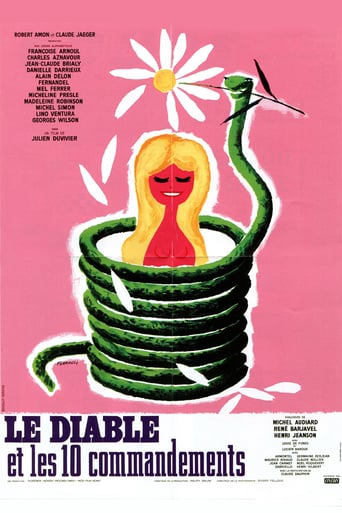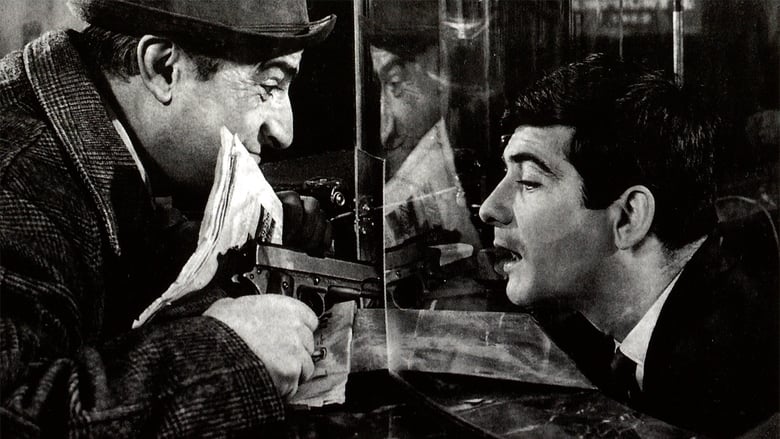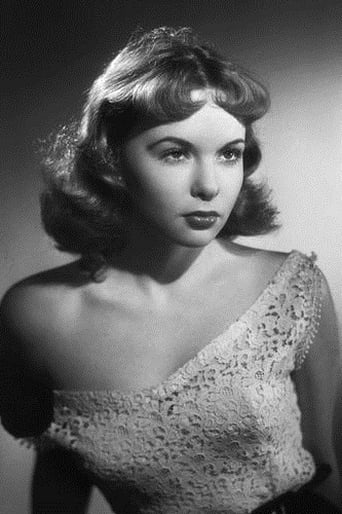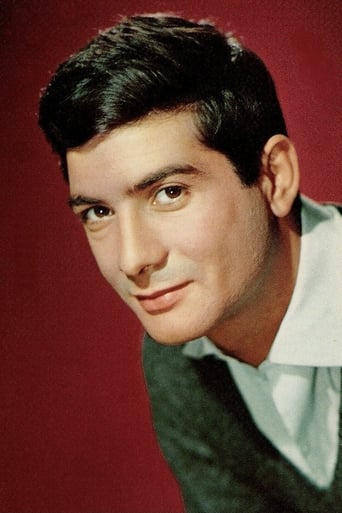

The Devil and the Ten Commandments (1962)
The film consists of seven roughly 15 minute episodes, each showing what will happen if one or more of the Ten Commandments will be broken: Jérome Chambard is warned that he will lose his job if he continues to swear; Françoise Beaufort enamored of a stripper calls on her only to find her married to a janitor who doesn't know what kind of dancing his wife performs; Denis, a Jesuit novice, leaves the order to avenge his sister's suicide, which was provoked by Garigny, who seduced her into prostitution and drug addiction; Philip buys a necklace for Micheline though he is bored with her; a young man find out that his real mother is not Madeleine, but actress Clarisse Ardant; Didier Marin, cashier of a bank, was fired by his boss; the Devil appears as a serpent for Jérome Chambard and the bishop are eating.
Watch Trailer
Cast
Reviews
Yawn. Poorly Filmed Snooze Fest.
This is one of the few movies I've ever seen where the whole audience broke into spontaneous, loud applause a third of the way in.
The acting in this movie is really good.
The movie turns out to be a little better than the average. Starting from a romantic formula often seen in the cinema, it ends in the most predictable (and somewhat bland) way.
By nineteen sixty three Julien Duvivier was on the homestretch of one of the most distinguished careers in French cinema with just two more films in him and what he didn't know about directing films in general and portmanteau films in particular you could fit in Godard's vest pocket and still leave room for a dozen How To Make A Movie manuals. Bizarrely the DVD - available only in France - is being marketed as part of a Michel Audiard collection despite the fact that Audiard only worked on one sequence as opposed to Henri Jeanson who worked on three. As always in this type of movie there's lots of joy for the French film buff in the names fleshing out the segments, never more so than finding Danielle Darrieux sharing a sequence with Madeleine Robinson - a thirties icon with a forties icon and, in the interests of passing on the torch, they share the segment with Alain Delon. Elsewhere the likes of Lino Venura, Michel Simon and Louis de Funes add their particular lustre but the best, not to say blackest, goes to Fernandel. Given Duvivier's output of top quality fare over six decades it would be incorrect to rate this among his best but even his second best is light years ahead of the Godards of this world.
In the fourth segment, Duvivier deals with one of the most esoteric subjects in the Christianity, and his challenge is realized in a miraculously simple script and the beautiful images. The abuses, the complains and the criticism of the dying old woman against God, they remind me of the first question by Satan on the mountain and The Legend of The Grand Inquisitor in The Brothers Karamazov. A lot of whys thrown by her ghastly senility would be ours, too : why does the mightiness of God easily change this world happier in a blink? Why does God refuse to change the stones in the wilds into millions of bread? God doesn't answer to her agonizing question directly, but he only says he loves all humankind, even though they are no more than a dust in front of the infinity of this universe. Love is the answer, and it's similar to the meaning of a silent kiss of Jesus in The Legend ... In this movie, God offers a miracle to the worn old woman nevertheless, but she doesn't desire it! This refusal is the most painful and heartbreaking one I have ever known in my life. As in a novel of Paul Gallico, 'Snowflake', we all would like to hear a tender voice, "Well done", at the last moment in this world after many trials and tribulations. The ending of this segment is tremendously shocking. But I don't want to consider it as a cynical derision against our (modest) goodness which can't help us comparing with the old woman at her death. I believe it mustn't be a cruel sarcasm at least for the woman who dies, given a benediction at the end of her life. Or rather, it should be a ridicule on those who martyr the true divinity among us and consider it as a kind of insanity. Anyway, Jesus after the Resurrection is a prisoner in that Legend, so is he in this movie (in an institution in this case). Willingly, he even gets into the car of those who will never understand him and are going to lock him up as a psychiatric patient.According to the iconography, the swallow is a symbol of the Incarnation of God, so the director describes it in the script, I guess. God by Fernandel is as impressive as Bruno 'Angel' Ganz (do most of celestial creatures wear a coat on the earth?). Especially, his figure carrying an African wooden totem on his shoulder could be an association with Jesus who walks alone, carrying a heavy cross also on his shoulder : Fernandel's steps seem so resolute and majestic in the scene, however.Today we know another masterpiece according to the Ten Commandments : Dekalog by Krzysztof. Kieslowski (1989-1990). It's wonderful, compelling and I do regret I should give only ten to this great work! Other interesting references : 1. Les Sept péchés capitaux by various directors (1952) 2. Children of Nature by Fridrik Thor Fridriksson (1991) (Fantastic! We can meet Bruno-Angel there again)
The film made up of sketches had always been Duvivier's forte:"un carnet de bal" "flesh and fantasy" and "sous le ciel de Paris" were brilliant achievements."Le diable et les dix commandements " seems at first sight a comedy but Duvivier's pessimism is just round the corner.Segment one cast Michel simon as an odd-job man,always swearing,which would not be that much offensive,if he did not work in a nunnery.Here comes the bishop...who is none other than an old pal of his.It's a farce a la "Don Camillo" which Duvivier filmed in the fifties .Segment two is still a comedy,borrowing a lot from Roald Dahl and his "Mrs Bixby " (which Hitchcock adapted for one of his shorts in "Hitchcock presents"),without giving the writer any credit.However ,all they did was replace the fur coat by a necklace .It's funny but disappointing if you know Dahl.With segment three,the tone drastically changes;it's no more a comedy,it's Duvivier's film noir again all over the place:Aznavour is a priest whose purpose is to avenge his sister who became a prostitute and a junkie because of a dangerous liaison (Lino Ventura).There's nothing rosy here and the finale is absolutely desperate.Segment four climaxes the movie :this sketch is a little masterpiece in itself .Duvivier plumbs the depths of sorrow:in a desolate country,a man (Fernandel) arrives in a poor farm where everybody 's lost faith in God ;in front of the house,they've put an Indian totem,which increases the madness of the situation.In a seedy bedroom,an old woman (Germaine Kerjean) is dying :the newcomer tells her he is God and he can help her and her whole family.Here begins a cruel dialog where Duvivier and Jeanson let their inspiration flow and thus take pessimism to new limits.The director's genius shines for the conclusion,which is completely unexpected ,and is a return to farce and derision...A "serious" ending would have led the viewer to despair.but not for long as segment five is some kind of tragedy :A young man (Alain Delon)learns that his mother (Madeleine Robinson) is not his mother ;So he pays a visit to his "true" mother (Danielle Darrieux) ,a celebrated actress.Alas,she's in love with herself.She barely looks at him,always wrapped up in herself,staring at the mirror .The happy end must not fool the audience.Duvivier's tale is a tale of selfishness and indifference.Segment six is the weakest,although it features Jean -Claude Brialy,Louis DeFunes and Jean Carmet fighting for a suitcase full of dough:there's only one good moment:the cop helps Brialy (the thief) to tie his case which is threatening to open.Segment seven returns the viewer to the nunnery where the sisters ask the bishop to teach the crude old man the ten commandments.This is an uneven work:if it were a minor director ,we would approve heartily of it.Coming from Duvivier,one of the greatest artists France had ever had,one could be more demanding.Obviously,the central segments (3,4 and 5) are the core of the movie,as strong as anything Duvivier did .But the rest is not in the same league .Besides,the concept is not always clear:the devil ,who works behind the scenes ,appears between them in the shape of a snake ,not a very original idea.A thousand times better,anyway, than the contemporary "les sept péchés capitaux" .
Enchants this film to Me because it is directed with masterful hand by a sensational director as Julien Duvivier. This film is not inferior other more prestigious films in front of like "Tales of Manhattan".Wonderful scenes rolled in Black and White and interpreted very well by many stars of exception: Danielle Darrieux, Françoise Arnoul, Fernandel, Mel Ferrer, Micheline Presle... but the best is ALAIN DELON, who shows why is one of the best actors in the world. I have seen this film 15 times. It catches of convincing the different episodies without boring. It's very interesting to see it.Would be advisable that this magnificent film saw everybody it because it has everything: love, humor, passion, suspense... and unfergettables performances by greats stars !!!


